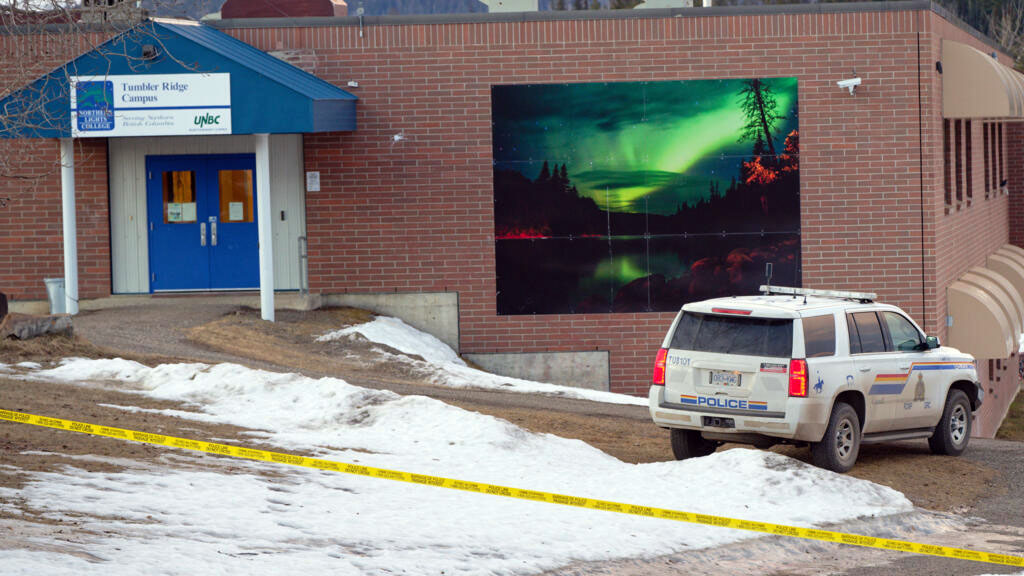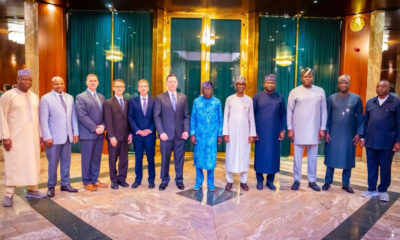International
US veteran ships Hollywood military gear for real-life use in Ukraine

Jon Barton spent his days reading scripts, advising costuming departments and thinking through fight choreography for top military movies.
The retired US marine took his expertise after four tours in the Middle East to Hollywood, consulting and providing military equipment to film sets – a mission to help the entertainment industry better depict military life.
Until late February, when Russia’s President Vladamir Putin launched his invasion of Ukraine.
Duty called again, Barton said.
Barton, owner of Night-Fire Media, a military consulting and rental company, is sending most of his company’s tactical gear to Ukrainians fighting Russian troops – backing a David-versus-Goliath fight for democracy that has the whole world watching.
“There is this inherent belief that something is wrong,” he said. “And if you’re someone who’s been trained to fight wrong and to stand up in the face of evil, you inherently get drawn into it.”
Earlier this week, Barton hurried around the Ukrainian Orthodox church in Echo Park, balancing two cellphones and juggling boxes of rifle slings, boots and camouflage uniforms. The supplies were to be boxed and flown to the border between Ukraine and Poland and distributed by volunteers. He said he hadn’t slept for two days.
“It’s super cold, so imagine fighting in those conditions,” Alex Dubov, a professor at Loma Linda University, who has family in Ukraine, said outside the church. “The boots that Jon was just bringing in is like, sent by heaven.”
Barton is not sending weapons or ammo – by law, he can’t – but this is crucial gear civilians often forget, he said. Many are everyday Ukrainians suddenly facing relentless shelling.
READ ALSO:
- APC Chairmanship Race: Why I Won’t Step Down For Buhari’s ‘Anointed Candidate’ – Al-Makura
- Malami: I Didn’t Clear Abba Kyari, But Asked For Further Probe
- Father remanded in Edo for defiling 15-month-old daughter
He’s donating about 80% of his inventory, including about 620 uniforms of various camouflage colors, 118 boots of different vintage and 300 pairs of gloves.
“Sometimes we forget the details – the slings, the canteens, the belts, the shoelaces. All that’s important,” Barton said.
The idea emerged after a friend asked if he had extra camouflage uniforms. Barton had already been stirred by an image of young Ukrainian men, clad in knee pads to fight Russian troops, and videos of Russians firing at the press.
“I said hold on, not just that, could you guys use knee pads? Could you guys use belts?” he said. “I have tactical gear, and I have it by the bucket-full.”
Barton was soon heading to Ventura county, where his company houses its inventory of gear from military base stores and third-party contractors, including phased-out colors and equipment for each branch of the military.
“My neighbors kept coming by like, ‘Are you planning for war?’ I’m like, ‘I’m giving it to Ukraine.’ They flipped out,” Barton said.
Bridging fantasy and reality
Barton has made a living advising Hollywood since he first worked as a set extra and realized the uniforms weren’t authentic. He’s worked with actors including Aaron Eckhart and Chris Hemsworth, and his credits include NCIS and Criminal Minds.
“When you’ve got a character using weapons … you want them to have adequate training, and the really important thing that Jon brings to table is that he understands it’s not the military – these actors are playing a role and you can’t treat each one the same way,” said producer Gale Ann Hurd, who first met Barton on the set of Punisher: War Zone.
It’s not about putting a gun in someone’s hand, he said – it’s about authentically bridging fantasy and reality.
READ ALSO:
- NDLEA nabs General Overseer of popular Anambra Church with drugs at Lagos airport
- Anglican Church Suspends Priest For ‘Impregnating Lady’ Who Approached Him For Help
- Lagos dispatch rider caught with child inside delivery box
“You could tune in Friday night at 9pm and watch JAG, but it didn’t look like CBS News at 7. What fantasy world are you living in?” he said.
Now, fantasy and reality are colliding again, and the threat of world war, or nuclear fallout, usually reserved for the big screen, feels close to home, he said.
“A lot of people don’t get too scared about this, but the marine in me used to sit through classified briefings and seeing satellite imagery,” he said.
There’s a part of him, too, that wishes he were there.
“My kneejerk reaction is always, let’s go in there, kick some ass,” Barton said. “And then I think about it and [realize], we can’t do that because this and this, and then the politics come into play and I totally get that.”
He also knows his involvement isn’t without professional risk. Barton has noticed some clients aren’t returning his phone calls.
“I’m less desirable to be hired on to a show where they try to take an apolitical stance, even though I’m not doing anything political,” he said. “I’m just trying to help humans.”
Still, Barton hopes larger film studios will follow his lead and donate their fleet of gear.
“Some of these prop companies have acres and acres of equipment, especially just uniforms and boots, something that we wouldn’t even bat an eye at in the film industry,” he said. “Oh, it’s just costumes.”
They say costumes, he said. “I say uniforms.”
The Guardian
International
Russia Escalates Digital Control with Attempted WhatsApp Block

Russia Escalates Digital Control with Attempted WhatsApp Block
WhatsApp has accused the Russian government of trying to completely block its messaging service in the country, a move aimed at steering users toward the state-backed app MAX. The Meta-owned platform said the effort, reported on February 12, 2026, threatens over 100 million users and undermines private, encrypted communication in Russia.
In a statement, WhatsApp said: “Today the Russian government attempted to fully block WhatsApp in an effort to drive people to a state-owned surveillance app. Trying to isolate over 100 million users from private and secure communication … can only lead to less safety for people in Russia. We continue to do everything we can to keep users connected.”
READ ALSO:
- Tumbler Ridge Massacre: Canada Investigates Shooter’s Mental Health, Police History
- Ex-Acting AGF Nwabuoku Admits Diverting N868.4 Million to Private Firms
- Kwankwasiyya Urges US Congress to Drop Kwankwaso’s Name from Bill
The attempt is part of a broader crackdown on foreign tech platforms in Russia. Authorities have previously restricted access to Facebook, Instagram, and targeted other services like Telegram. Reports indicate that Roskomnadzor, Russia’s communications regulator, removed WhatsApp from its national internet directory, forcing users to rely on VPNs to access the platform. Critics warn that such measures are designed to expand state surveillance and control over digital communication.
The government is actively promoting MAX, a domestic “super-app” similar to China’s WeChat, which combines messaging with other services. Rights advocates caution that the push toward MAX could compromise privacy protections that platforms like WhatsApp provide. Meanwhile, Kremlin officials have indicated that WhatsApp and other restricted apps could be restored if Meta complies with local data storage and regulatory laws.
WhatsApp’s statement emphasizes that the company will continue to work to keep its service accessible where possible, but the attempted block highlights Russia’s ongoing effort to enforce digital sovereignty and shift users toward state-controlled technology platforms.
Russia Escalates Digital Control with Attempted WhatsApp Block
International
Tumbler Ridge Massacre: Canada Investigates Shooter’s Mental Health, Police History

Tumbler Ridge Massacre: Canada Investigates Shooter’s Mental Health, Police History
Canadian authorities are intensifying investigations into the mental health history and prior police interactions of Jesse Van Rootselaar, the 18-year-old who carried out a deadly mass shooting in the remote mining town of Tumbler Ridge, British Columbia, on February 10, 2026. The tragedy has left the small community in mourning and raised national questions about gun control, mental health support, and law enforcement interventions.
According to RCMP Deputy Commissioner Dwayne McDonald, authorities are still unclear on the motive behind the attack, which is one of the deadliest school shootings in Canadian history. Van Rootselaar, a transgender woman who had dropped out of Tumbler Ridge Secondary School four years ago, first killed her mother and stepbrother before opening fire at the school, where she shot six more victims. The shooter later took her own life at the scene.
Investigators have confirmed that Van Rootselaar was known to police and had previous interactions with the public health system due to mental health concerns. Authorities are reviewing prior incidents, including earlier firearms seizures and her lapsed gun licence, to understand how warning signs were addressed before the massacre. British Columbia Premier David Eby said officials are working with the health system to determine “what interactions may have taken place” in the past.
READ ALSO:
- Ex-Acting AGF Nwabuoku Admits Diverting N868.4 Million to Private Firms
- Kwankwasiyya Urges US Congress to Drop Kwankwaso’s Name from Bill
- Liverpool Edge Sunderland 1-0 to Halt Impressive Home Streak
The victims include a 39-year-old female teacher and five students aged 12 and 13, with one child, 12-year-old Maya Gebala, in critical condition after trying to lock herself and classmates in a library during the attack. First responders arrived within minutes, but the scale of the violence left the tight-knit community of about 2,700 residents reeling. Hundreds gathered for a candlelight vigil to honour those killed and injured.
Prime Minister Mark Carney addressed parliament, describing Tumbler Ridge as a resilient, compassionate community of miners, teachers, and construction workers, and emphasised the need to learn from the tragedy. Flags across Canada have been lowered to half-staff for seven days in remembrance of the victims. Britain’s King Charles and Queen Camilla also expressed shock and sorrow over the massacre.
Schools in the area will remain closed for the remainder of the week as authorities continue their investigation into Van Rootselaar’s mental health background, police interactions, and access to firearms, seeking to understand how similar tragedies can be prevented in the future.
Tumbler Ridge Massacre: Canada Investigates Shooter’s Mental Health, Police History
International
Canada Mass Shooting: Nine Dead in School, Residence Attack

Canada Mass Shooting: Nine Dead in School, Residence Attack
A mass shooting in Tumbler Ridge, British Columbia, Canada has left nine people dead and dozens injured after an attacker opened fire at a secondary school and a nearby residence on Tuesday, February 10, 2026.
According to the Royal Canadian Mounted Police (RCMP), seven victims were killed at Tumbler Ridge Secondary School, while two others died at a residence connected to the incident. At least 27 people were wounded, including two in critical condition, while the rest sustained non-life-threatening injuries.
The suspect was found deceased at the scene from an apparent self-inflicted injury. Authorities have not yet released the identity or motive behind the attack, which has shaken the small community of roughly 2,400 residents.
READ ALSO:
- Police Arrest Suspect as Youth Suffers Head Injury in Vigilante Custody
- Boko Haram Seizes Four Trailers, Rustles Over 100 Cows in Borno
- Wike Backs Tinubu’s Peace Efforts, Vows Stability in Rivers
Police responded rapidly, issuing an active shooter alert, placing schools on lockdown, and evacuating students safely. The RCMP and local officials continue to investigate the circumstances surrounding the attack and the suspect’s background.
Local leaders described the event as a devastating tragedy, expressing solidarity with victims’ families. The shooting has prompted national attention in Canada and renewed calls for enhanced school security and measures to prevent mass shootings.
Authorities have urged the public to remain vigilant and report any suspicious activity, emphasizing the importance of community cooperation in maintaining safety and preventing similar tragedies.
The attack is considered one of the deadliest school-related shootings in Canada in recent years, drawing widespread condemnation and grief across the country.
Canada Mass Shooting: Nine Dead in School, Residence Attack
-

 metro2 days ago
metro2 days agoLeadership Crisis at NAHCON as Chairman Abdullahi Saleh Usman Resigns
-

 News2 days ago
News2 days agoOyo Muslims Reaffirm Loyalty to Sultan on Islamic Matters — Grand Chief Imam
-

 News2 days ago
News2 days agoUS Judge Orders FBI, DEA to Release Tinubu’s Criminal Records, Faults Delays
-

 International2 days ago
International2 days agoUS to Deport 18 More Nigerians on ‘Worst-of-the-Worst’ Criminal List (Full Names)
-

 metro2 days ago
metro2 days agoFormer NAHCON Chief Explains Why He Stepped Down, Denies Conflicts
-

 Business2 days ago
Business2 days agoNaira Posts Strong Comeback, Breaking Two‑Year High Against Dollar
-

 Business3 days ago
Business3 days agoCAC Deploys AI, Partners Google to Tackle Rising Business Registration Demand
-

 metro3 days ago
metro3 days agoCourt of Appeal Affirms Senate’s Power to Suspend Natasha Akpoti













